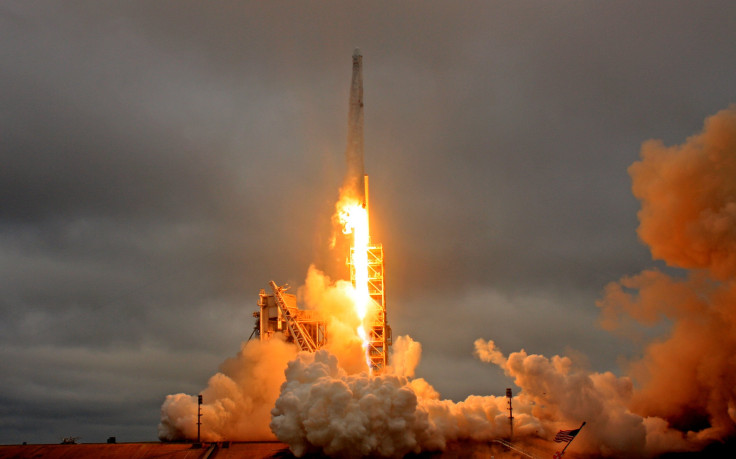SpaceX Schedule: Falcon 9 Launches, Reused Rockets, ISS Cargo Delivery, Internet Satellites

After the perfect execution of yet another launch and landing of the Falcon 9 rocket on May 1, Elon Musk’s space venture, SpaceX, has a lot of other exciting things in the pipeline over the next two months. The company also has long-term plans to launch a suite of satellites that will provide high-speed internet to the entire planet, for which it provided details earlier this week.
With two more months left in the current financial quarter, SpaceX has a busy launch schedule. The company began the month with putting a U.S. government spy satellite into orbit, and then landing the first stage of the Falcon 9 back on Earth. And the only other likely launch this month will be another Falcon 9 rocket, from the Kennedy Space Center, Florida, which will carry the fourth communications satellite of Inmarsat’s Global Xpress network. The launch is currently scheduled for May 15, according to SpaceFlightNow.
The Inmarsat 5 F4 spacecraft was originally planned to be launched aboard a Falcon Heavy rocket. The British satellite communications company took away some business from SpaceX, following the September launch pad explosion which destroyed both a Falcon 9 rocket and its payload, a Spacecom communications satellite. That accident delayed all the launches scheduled by SpaceX while the company investigated the incident and got clearance to fly again.
In contrast with May, June will likely be a lot busier for SpaceX, as the month kicks off with a Falcon 9 launch that will carry an uncrewed Dragon spacecraft to the International Space Station. The June 1 cargo resupply mission for NASA will be the company’s eleventh.
Later in the month, SpaceX will, for the second time, reuse a Falcon 9 rocket. A mid-June launch of BulgariaSat 1 will use a refurbished Falcon 9, after the company did so successfully for the first time March 30, when it launched SES-10 satellites. If the launch goes as per the schedule, SpaceX would have brought the turnaround time for reusing rockets to about five months. The payload for the launch is a communications satellite for Bulsatcom.
Late June will see a flurry of activity, with three launches of communications satellites. One is for the Intelsat 35e, which will become a part of Intelsat’s “Epic” fleet to provide coverage over North and South America, the Caribbean, Europe and Africa.
Another launch would be the second set of 10 satellites for Iridium. The Iridium Next 11-20 satellites are part of the company’s mobile communications fleet. This launch, currently scheduled for June 29, will take place from the Vandenberg Air Force Base, California, while the rest are set for taking off from Florida.
The last expected launch in this quarter will be the SES-11/EchoStar 105 hybrid satellite.
The company or Elon Musk made no announcement in November, but at that time, SpaceX had filed an application with the Federal Communications Commission to launch a constellation of satellites that would provide high-speed internet coverage to the whole planet. While a lot of details were available at the time, there was no clarity on when the satellites would launch.
Speaking before the Senate’s Committee on Commerce, SpaceX vice president of satellite government affairs reportedly said the company would start testing the satellites later this year, and that phased launches would start in 2019.
“The remaining satellites in the constellation will be launched in phases through 2024,” she added.
© Copyright IBTimes 2024. All rights reserved.




















